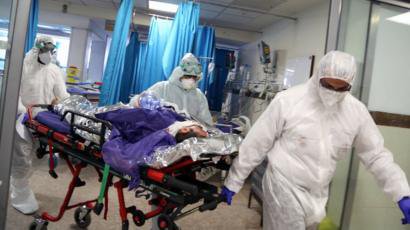IRAN’S government has been criticised for covering up their actual coronavirus death toll, according to a data leak.
Iran has claimed that 17,190 people have died from COVID-19, according to Johns Hopkins University which uses government reported data. But a leak has exposed that the government’s actual death toll data is nearly triple what they have reported. According to the leak, Iran has seen nearly 42,000 deaths.
Iran’s government has also been accused of misreporting their case total, with the actual number being almost double what was reported.
It has seen 451,024 cases of coronavirus, as opposed to the reported 278,827.
Another horrific reveal from the data shows that the first coronavirus death in Iran was on January 22.
Iran claimed that its first case of the virus on February 19, where 52 people had already died.
Data leaked from the ministry claims that nearly 42,000 people have died contains details of hospital admissions across the country, with personal information of each patient.
It shows that Tehran, Iran’s capital, has seen the highest number of deaths from COVID-19, with 8,120.
Qom, which was the initial epicentre of the virus, also saw the highest death rate in the country with 1,419 deaths, equal to one death per 1,000 people.
The health ministry’s reported death toll figures for the peak of the pandemic in mid-March were a shocking five times lower than the official statistics.
Iranian authorities have been accused of deliberately suppress the coronavirus deaths because of the data.
The leaked information was sent to the BBC by an anonymous source, but they could not verify where the source worked or how they obtained the information.
Many observers have previously stated that Iran’s official figures were suspect.
Irregularities in coronavirus data between national and regional levels have been highlighted by local authorities.
Dr Pouladi, using a pseudonym, said to the BBC that the health ministry “was in denial” about the pandemic.
He said: “Initially they did not have testing kits and when they got them, they weren’t used widely enough.
“The position of the security services was not to admit to the existence of coronavirus.
Dr Nouroldin Pirmoazzen, former MP and official at the health ministry, told the BBC that the Iranian government was “anxious and fearful of the truth” when coronavirus hit Iran.
The doctor pinned this on issues with US sanctions and the aftermath of general Qasem Soleimani’s assassination.
He said: “The government was afraid that the poor and the unemployed would take to the streets.”
But Iran’s health ministry has hit back against the claims.
The ministry said that the country’s reports to the World Health Organisation regarding the number of coronavirus cases and deaths are “transparent” and “far from any deviations”.

